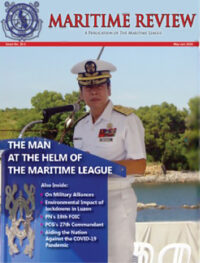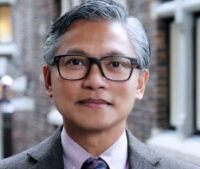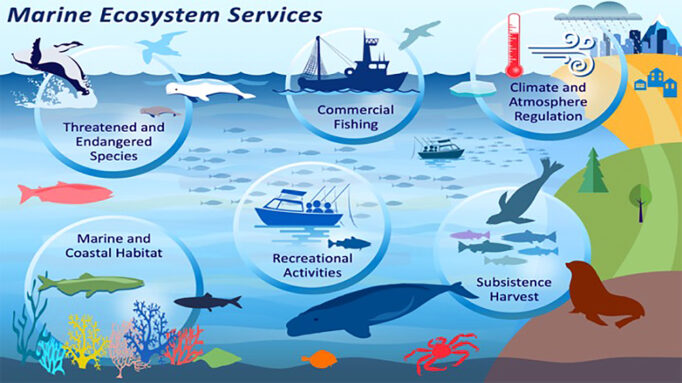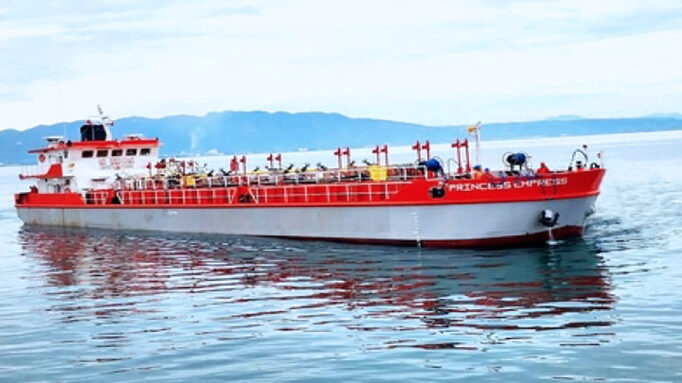First of all, I am thankful to be a member of the prestigious Maritime League and being able to attend its Maritime Forum where I have exchanged notes or opinions with some of its members, either through the Forum or private messages.
I am very honored to have exchanged notes with no other than the Former Associate Chief Justice Tony Carpio on more than one occasion, and likewise with the experienced Mariner Jeffrey Solon.
In addition to the Forum, the direct private messages when it comes to the Maritime League is more than small talk –it is an avenue for imparting knowledge and wisdom based on experience. To name a few are Vice Admiral Bobby A Empedrad, former Navy flag officer in command; and Vice Admiral Joel S Garcia, former PCG Commandant, who have given me valuable knowledge and advice.
Recently, I got a series of messages from Mr. Francis Carlos whom I think has been there and done that like the people I mentioned. He encourages me in many ways. He is the new Dean of the UP College of Human Kinetics.
The Blue Economy. On the launching of BEACON 2023, the current PCG Commandant Artemio Abu mentioned another member of the league, Dr. Cora Claudio who wrote on the Blue Economy. In the forum, she always reiterates our being a MAN or a Maritime and Archipelagic Nation. September is MANAMO month but what happens before and after September? We return to our old ways, not aware that we are a “MAN” in more ways than one.
The next generation will thank us if we get our act together and leave a legacy of a maritime domain cared for by environmentally aware citizens whose land area is just a third of its waters.
Maritime Education. The importance of Maritime Education cannot be over or understated. Maritime education is in good hands for the local and international Maritime movers and shakers. We have the Maritime Academy of Asia and the Pacific (MAAP) headed by no other than our very own Vice Admiral Eduardo Ma R Santos, and the World Maritime University (WMU) led by Dr. Max Mejia as its new president.
Beginning in 2006, we were always on our toes walking on eggshells trying so hard not to be banned by the EU, thanks or no thanks to the European Maritime Safety Agency (EMSA).
Since we know our Maritime Domain’s size is more than 3x the area of our land, our Maritime Domain Awareness must be coupled with Maritime Security to have our Maritime Sovereignty always in check.
I have tried to discuss that in my Maritime Education article and my Maritime Security and Sovereignty article.

Here is an article on VADM Eduardo Ma R Santos written by CDR Mark R Condeno PCGA. There is a host

of degrees that you can aspire to earn at MAAP, and learn its educational objectives and program outcomes. And you could also get to know more about the achievements of Dr. Max Mejia from the WMU.
National Security and Defense. I have written about Amending the National Defence Act (NDA) and the Philippine Navy which happens to be my maiden voyage for the Maritime Review. I found the constructive difference of opinion between Commodore Jay Tarriela and Dr. Jesse Pascasio worth writing about. Commodore Tarriela believes that the NDA needs amending in regards to the tradition of having DND Chiefs from the Army be changed to having DND chiefs from other branches of service, and the Navy is one of those main branches. Dr. Jesse Pascasio thinks we need to have strategic thinking but we need to set aside legislating the amendment for now.
I also wrote about our National Security Interests. As Lord Palmerston said, paraphrasing him loosely, there are no permanent friends, only interests. That quote is the unofficial Foreign Affairs policy of all nations.
National Security and Defense is a broad subject matter, but first we have to define it as the Security and Defense of a sovereign state including its citizens, economy and institutions, which is regarded as a duty of government. Whereas, national Interest is a sovereign state’s goal and ambition, taken to be the aim of government.
Our all-government approach mantra is exhibited by our Inter-agency cooperation and coordination of all our government agencies in the blue economy and recently as exemplified by the IATF during the pandemic. But truly, we must think beyond the all government approach by involving the NGOS and the private sector through an Inter-Organizational Coordination.
We can call it an whole-of-nation approach to national security like our issues in the West Philippine Sea (WPS) which seems to be a zero-sum proposition and a winner-take-all scenario, and turn it into a win-win scenario for all parties concerned, short of triggering another world war. Let us all do all what we can for world peace to prevail.
Maritime Safety. I have written about the past IMO conventions and pending legislations for the safety of lives at seas. As of this writing I have an article pending approval about the Maritime Legislation and the Marine Environment. It is about some pending legislations that have to do with the Blue Economy.
Marine Environment. The Marine environment accordingly means those areas and ocean waters, and their connecting waters and submerged lands thereunder.
In my article on Maritime environment, I wrote about the following: Coral reefs annihilation; Manila Bay reclamation; Plastics and other pollutants; The Ocean Savior project; Ammonia powered ships; and Ship Recycling
Our coral reefs are the habitat of fish, our BFAR has programs like the LAMBAKLAD Development as a way to promote sustainable fishing technologies to enhance fisheries production while minding resource capability.
We must continue to monitor against dynamite and cyanide fishing and other destructive practices.
The Manila Bay reclamation should also be reconsidered because to protect our coastal lands, and avoid instances where ground water’s pace of replenishment will be more difficult.
Much has said about the Philippines’ contribution to ocean pollution in the world as being in the top 3 list of polluters. A whole-of-nation approach is needed in this endeavor led by the DENR, our Coast Guard, and the Local governments.
In addition to Boyan Slat’s ocean clean-up project, there is the Ocean Savior project that collects ocean debris and has a built-in plastic recycling system.
The shift from fossil fuel-powered ships is starting to progress with the Ammonia-run ships and other alternatives like Hydrogen and Methanol which are already happening. Other non-fossil-based fuel alternatives that may bring the maritime industry closer to net zero emissions are Biofuel, Ethanol, as well as renewable energy like Offshore Wind Turbines and Wind Sails.

Ship Recycling. The Aircraft carrier of Brazil had to be sank because it was already a danger to the coastline and no country wanted to recycle it like having too much asbestos and other dangerous materials. If our shipbuilding expands exponentially, it would be best to have a greener and safer way to recycle ships.

Mindoro Oil Spill. This unfortunate event happened recently and it is another lesson learned. Our leaders might review the existing regulations, procure more search and rescue equipment and other needed equipment for such disasters.
This writer and all of the writers of the Maritime Review having explored the elements of our Blue economy, this is our contribution to make Maritime Awareness not only during September but all year round, the BEACON 2023.
![]()
Kudos to the Maritime League for a wonderful and successful launch of the September big event called BEACON 2023 onboard BRP Gabriela Silang, hosted by PCG. I am looking forward to the success of the event itself co-sponsored by DOTr.
About the Author:
Karl Misa Garcia’s interest in the Maritime Industry goes way back when he was an employee of Asian Terminals, a port operator at the South Harbor Port of Manila. But his interest in everything maritime maybe in his DNA being a son of a former Navy Officer. He also had a stint as a consultant to Senators Biazon and Trillanes. He is a graduate of BS Computer Science from AMA Computer University. He earned his MBA from De La Salle University Graduate School